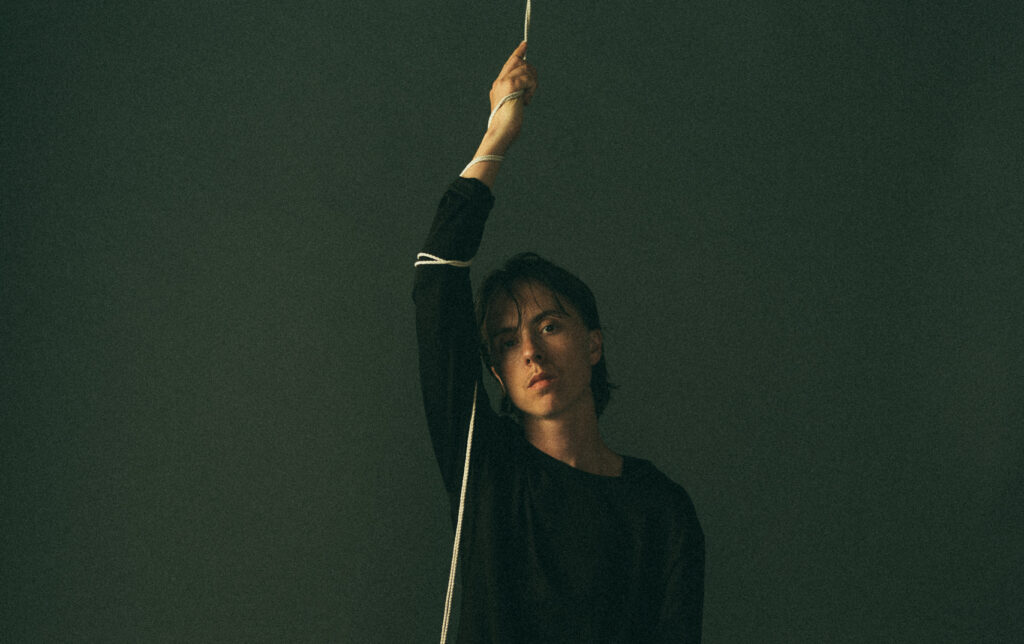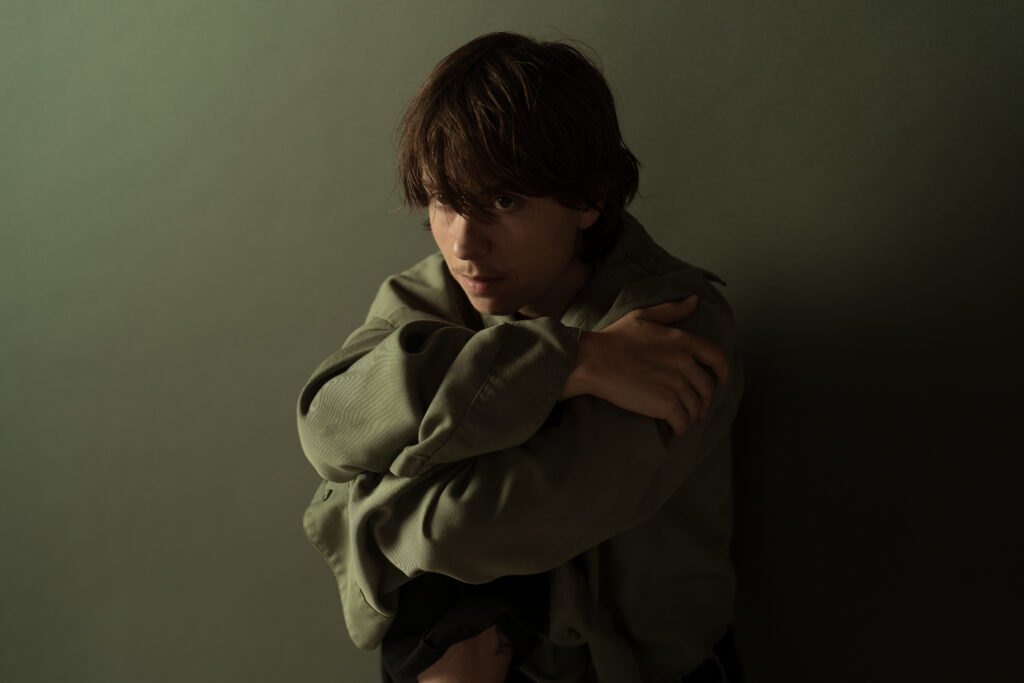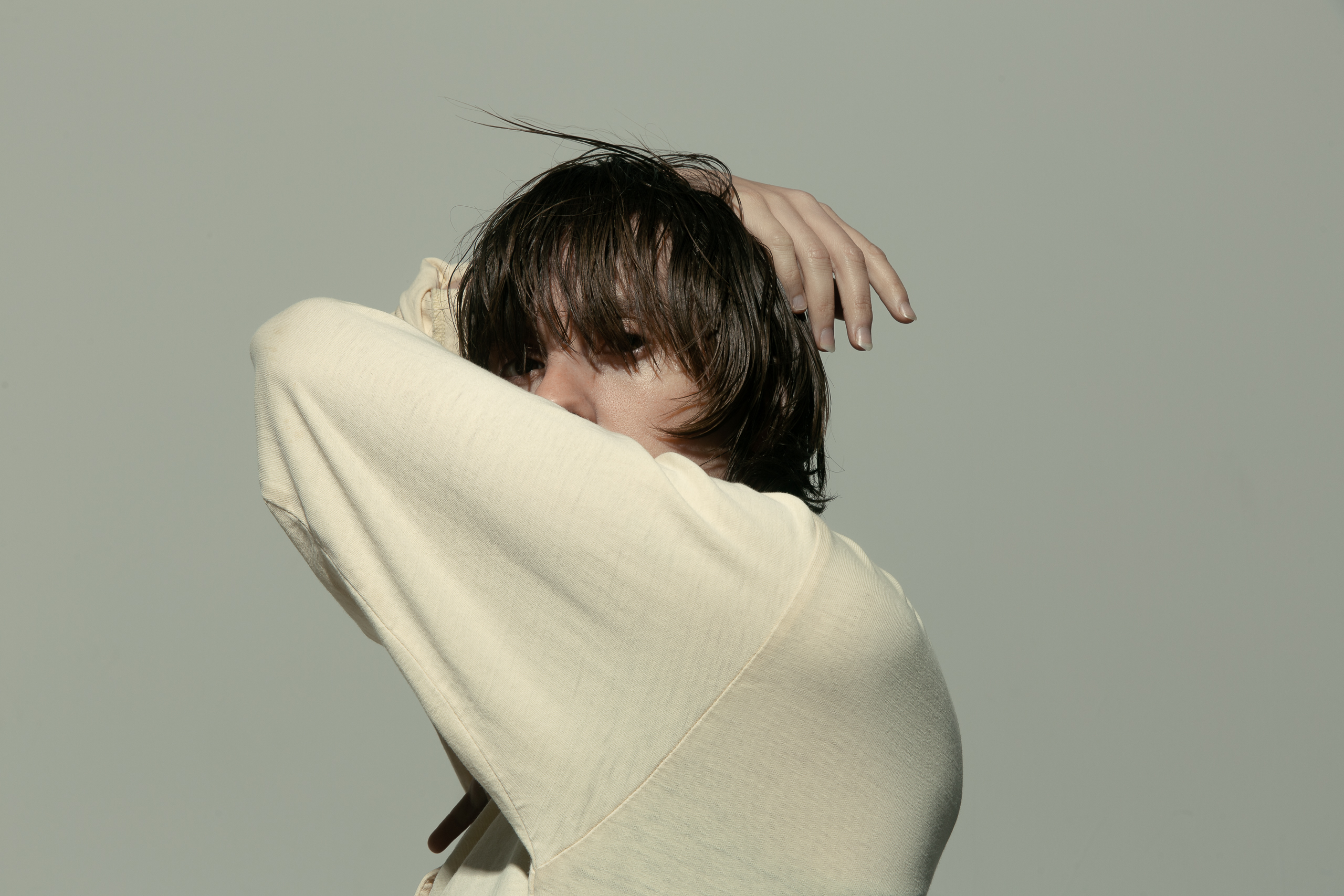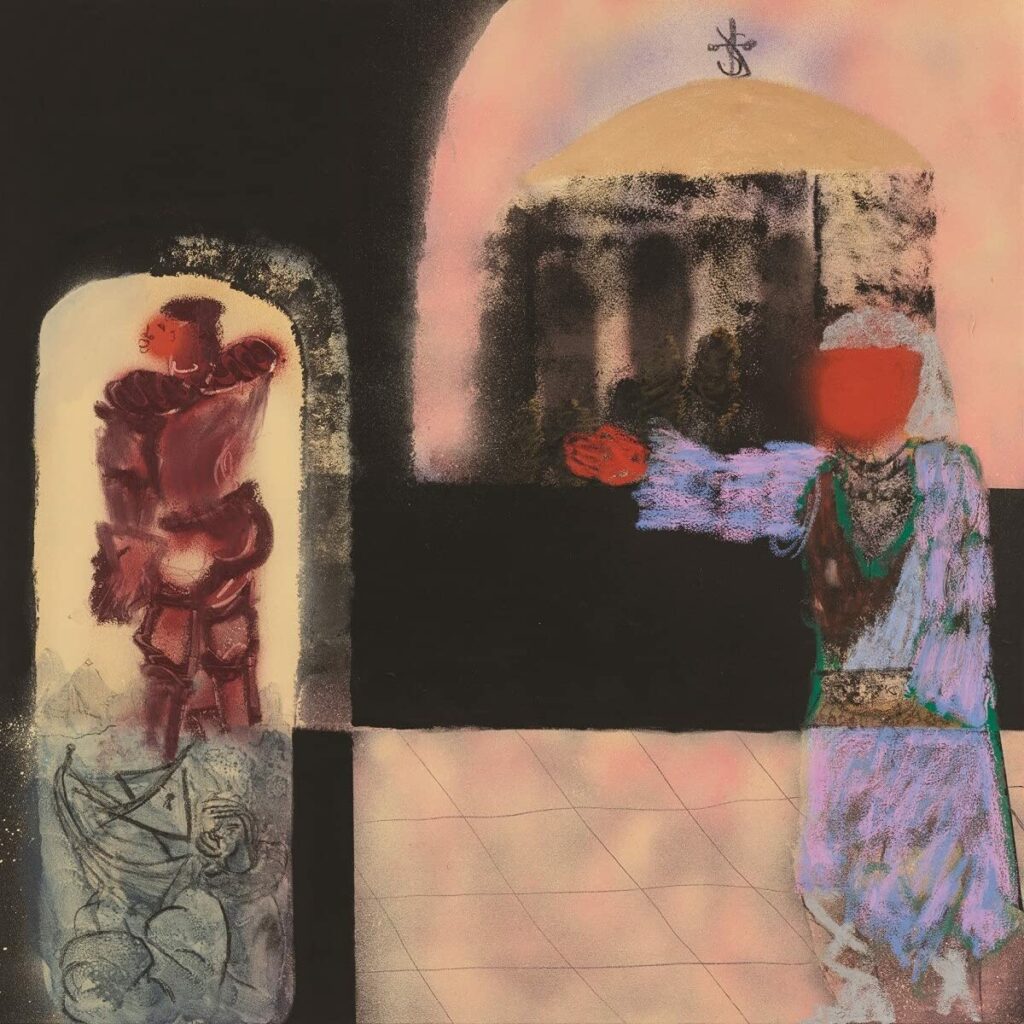Fotos © Jacob Boll
Mit Fun House erscheint am 22. Oktober das dritte Album von Hand Habits. Das Projekt von Meg Duffy ist uns spätestens seit der zweiten Platte placeholder ein Begriff – die sich durch ihre eindringliche Emotionalität eingepackt in reduzierten Folksongs in unser Herz geschlichen hat. Das neue Album kommt hier anders daher. Produziert von Sasami Ashworth (SASAMI) und gemischt von Kyle Thomas (King Tuff) ist der Sound ungewohnt elektronisch, treibend und vielfältig – aber immer noch klar. Duffy hatte in der Pandemie die Zeit, sich mit den eigenen Liedern ausführlich auseinanderzusetzen, Grenzen zu überwinden und sich durch die Auseinandersetzung im Team ein Stück neu zu erfinden. Entstanden ist eine Platte, die die wohl beste Seite der KünsterIN (they/them) zeigt.
Wir hatten Anfang August die Gelegenheit, mit Duffy über das neue Album und den Entstehungsprozess per Zoom zu sprechen. In dem sehr offenen Gespräch erfahren wir mehr über die Schwierigkeiten, sich neuen Vorschlägen komplett zu öffnen und den Moment, der das Umdenken brachte. Duffy beschreibt eindringlich den intensiven Entstehungsprozess der Platte und die Erkenntnis, dass Veränderung oder Bearbeitung von Songs nicht unbedingt eine Verwässerung ihrer Bedeutung nach sich zieht. Wir sprechen über die besondere Beziehung zu SASAMI und wie es war, Kollaborationen anzufragen statt sie einzugehen. Im Gespräch wird deutlich, wie viel sich in der Zeit des Schreibens und der Aufnahme in Duffys Leben und Denken verändert hat. Außerdem erfahren wir, warum es manchmal nötig ist, sich bei Liveshows von der eigenen Gefühlsebene zu entfernen und warum es so viele Vorveröffentlichungen zu Fun House gab, auch wenn Duffy nicht an Marketingstrategien im Veröffentlichungszirkus glaubt.
Congratulations on your new record Fun House. I find it moving in the most energetic way as it feels clear and liberating, but also very emotional. How did it feel making it?
We did pre-production in October and started tracks in November. It was fall and then winter, the seasons started changing. I felt very present and grounded and excited making it. It was something to do every day that felt creatively enriching. During the recording process I was very grateful and ecstatic. I love making records, I love the world that you create. When a song feels out of focus and suddenly, when one thing gets added, it flips around and makes sense. That excitement feels very addictive.
The recording situation was very different from your last album placeholder. You were not between tours, you had time, you were home… Theoretically you could have stayed with each song as long as you liked. Did you? And does that reflect sonically and lyrically?
I took more time with these songs and spent more time getting to know them. I tried to understand what I was trying to say. I have never approached songwriting that way before. I used to think that the emotional meaning of a song would get lost if I edited it too much. I have grown away from that perspective. I truly believe now that the emotional DNA and where the song is trying to bring me is imprinted in the song even if you take everything away and replace it. I edited a lot of the lyrics. I typed them all out and I would change them. I just had more time for it all. And I had nothing to lose at that point. Time is such a finite source, it is something that feels very finite when it comes to process. I do not live an artist’s life usually taking as much time as I want, I like being busy. I was forced to not be busy. Also working with Sasami and Kyle has sonically changed the tones. I feel like the record has a very specific sound. With placeholder I recorded some of it at one studio, the vocals in another studio, I mixed it at another studio. This time, we did everything here.
 Yet, the record is very diverse. Even though you had more consistency in the recording process, the sound is very rich and changing. Has that been your plan from the beginning of writing and recording or is that another thing that developed with time?
Yet, the record is very diverse. Even though you had more consistency in the recording process, the sound is very rich and changing. Has that been your plan from the beginning of writing and recording or is that another thing that developed with time?
Both. I planned from the beginning to not make another placeholder. I could have done that in a week: getting a band and letting the arrangements come very quickly and simplistically. It is not exciting to me to do the same thing. Also given the time, it felt like it was ready for me to try and get beyond my reach a little bit. After Sasami and I did 4th of July together and saw how she pulled me out of my fears and pulled me into this world where my song is still intact and the ethos of songwriting for me still feels very much there but graduated in some way. With Fun House Sasami and I went back and forth with the demos in pre-production. For example, the demo for Aquamarine was very slow with finger-picked guitar and some slide guitar. I have a vocabulary of a sonic palette and Sasami has a very different palette. Her records are synth-based with electronic elements. Kyle is a rock’n’roll god and listens to weird instrumental music from the 40s and 50s. Between the three of us, we had an amazing library of influence to draw from. I was really, really intentional. It was hard for me at first to get out of my comfort zone. I pushed back. My fear and my insecurity was that this is getting too far away from me. But it feels closer to me now. It is closer to music that really excites me.
It sounds very intense. You need a lot of trust to let that happen. How do you choose the people you work with?
Sasami and I had been friends at this point for a long time. I was always a little intimidated by her, because she is so nice and kind. We toured together before and I love spending time with her. Musically, she takes it very seriously. She is obsessed with music. In the past, I was a little more stubborn back then working with some people. I felt like I had to do my vision and if it was not my vision it would not mean as much to me. But Sasami challenged me. Trust can be so hard for me anyway. It is hard to trust somebody, it is so vulnerable. I remember pushing back on Sasami on one thing and I was in a big “no-mood”. She was like, “I need you to trust me, because I have your best interest in mind. I am not doing this for any other reason than to evolve the songs”. She got straight up with me and said, “If you are not going to trust me, this is not going to work.”. She asked me if I was just uncomfortable or if I really did not like it. She said, “I do not think you do not like this, I think you are just not used to this”. She was right. She called me out. After that moment I felt like it was on. There would still be moments where I was still adverse to what was happening, because the picture was not completely in focus yet. But I learned so much with making this record and to put the trust in people that are not me, because I do not always know what is best.
You have been on the other side of collaborations a lot, you have played with so many artists on so many records. How different is the dynamic when you are the one asking?
There are a couple of people on the record and it was all very COVID safe with only one person being at the studio at the time. But it was very fun, because those were the only people we saw all over sudden. It was really exciting for me to tap all these people that I have played music with outside the context of my own music. There were two people I was really really nervous to ask. One being Michael from Perfume Genius. Our friendship is still new. I have been in his band and that is the dynamic. But when he came in, it was amazing. He said, “Of course, I will do it! Are you kidding?” I was also nervous to ask the bass player and amazing musician and now dear friend Daniel Aged. He plays on No Difference and False Start. I had never met or known him, we were just friends online. He is one of the greatest bass players I have ever seen and it was spiritual watching him play. I was nervous to ask him and it was strange meeting someone for the first time in a pandemic and having him play on a very intense song. Generally, I felt that it was finally time. With placeholder there were a couple of people I asked to sing, but it was a little less vulnerable.
The making of the record sounds like such an intense and life changing experience. I feel like that spirit of growth and excitement really translates into the music. It sounds very forward and strong. But it also deals with hurtful memories and stories about yourself and people close to you. How is it to revisit your former self through art? It is different from looking at photos, you really need to feel your former self again.
I spent so much time of my life not doing that. I can be pretty nostalgic in some ways of my life, but not for myself. It would always be outward nostalgia. I like the idea of revisiting the past through art as a somatic experiment. It can be intense, but I had the space to do it. There is such a wealth of experience to draw from just by sitting and remembering things. It sounds trivial, but in the practice of revisiting the past – like with Aquamarine – I had no other information than the past. Going past and sitting in the discomfort of it, that is where healing happens for me in a powerful way. Since music and songwriting is such a big part of my life, it would be hard for me to keep it away from that.
Is it hard to not judge yourself during that process? Your former actions, feelings…
Yes, of course. But I have spent so much time of my life judging myself and judging other people, feeling guilty, shaming myself, believing other people. I knew that I did not want to make another revenge record – a record where I am the victim. Either that is the victim of myself or the victim of someone else. But usually it is the victim of myself. I knew I did not want to do that again, it is exhausting singing about it all over again. It keeps you there. I do not want to be that person anymore. I would like to work against it. It can be hard to not be judging, but I was in a practice of being gentle to myself and really zooming out to get a panoramic view to see where that resentment and anger was coming from. The only way to move through it was to accept it and to realize that it is okay and tell myself that. To look in and also to look out.
It is very intimate work and you share it in the most public way. I saw you in Berlin when you were supporting Angel Olsen and played this incredibly vulnerable placeholder show. That was very special for me, because I understood how nerve wrecking and how incredibly strong it must be to show so much of your inner self to complete strangers in a big venue. How do you feel before and after shows?
For shows I kind of have to turn off parts of my emotional body. I do not know if that is great, but that is what is dangerous about being on tour a lot. You do get into the practice of dissociating from the things that you are saying. If I do not, I can get into the feeling every night and that is not good for my nervous system. It does become work and the ritual makes it easier. I focus more on what my voice sounds like rather than what I am saying. I just did a solo tour and after not playing for a year and a half I find myself getting way more emotional on stage. I do not know if that is good, because I cannot sing when I get choked up. It is intense. I do not want to support tours in that way, when half the people do not even care that you are playing. I sometimes like the energy of having to prove myself, but having to prove myself with a song about my mother commiting suicide is really intense when people are drunk and talking over you. It is a balance and playing with a band helps. It feels very supportive and you are not alone. It is not just me and my song.
The German press release states that fun house is your most ambitious album yet. How would you describe the ambition behind it?
Musical and sonically the ambition was to get out of my comfort zone and explore sonic, lyrical and structural territories that I have not explored yet. This might alienate the people who just want to hear an acoustic folk song, but sorry… I do not really think about the commercial aspect, which probably defeats me a lot in my career.
 Speaking of the commercial side, I was wondering why you put out the dirt EP and four singles this year before the album release. Why did the songs not go on the album?
Speaking of the commercial side, I was wondering why you put out the dirt EP and four singles this year before the album release. Why did the songs not go on the album?
Technically, on dirt it is only one new song as one is a cover and one is a remix. I thought that was going to be on the record, but my label suggested an EP. I wanted to put 4th of July on the record too, but at the end of the recording we had too many songs. motherless and no reply were also two songs I put out before this record, but I actually thought they were going to be on the record as well. But weirdly, those two were the ones that Sasami said were the ones that she thought did not fit. I thought they would be a big part of the record. The content is so similar, they are about those memories and my mother. I was glad they were seperated in the end, because I got to work with other people and try even weirder shit. I wanted to try to put out songs. I do not want to play by these weird rules in the music industry. A lot of them do not even make sense to me and feel very arbitrary. I am very stubborn and a disagreer. If somebody says, “This is just the way it works”, I do not like that. I think about why and if anyone really likes it and if it actually works and who is benefitting from it. I liked how Bill Callahan rolled out a new song every Monday from his last record. With singles people often only listen to the first one and that is the most listened to song and then interest dwindles. I did not want to care about that. I can get caught up in the thought that there is a one or two week window where your record can be digested. But there are records that came out three years ago that I still want to finish listening to, because I never got around to it.
Thank you for the interview!













